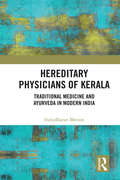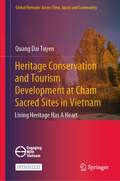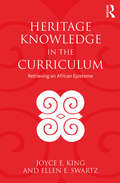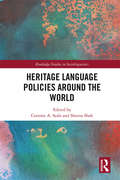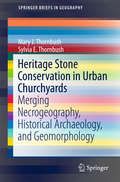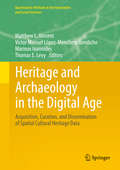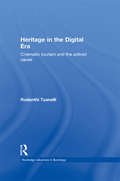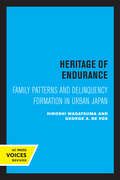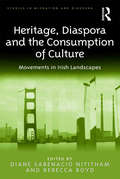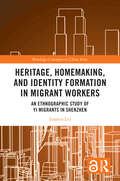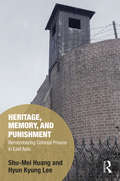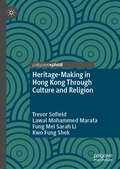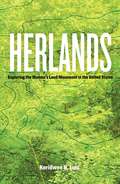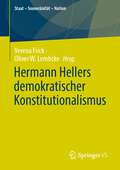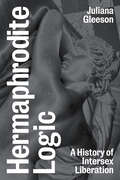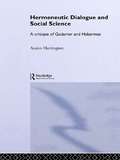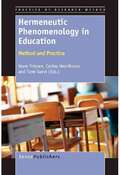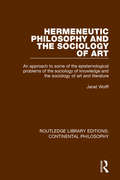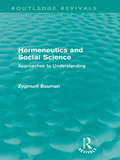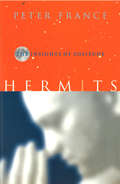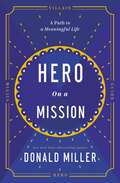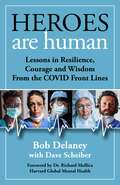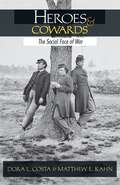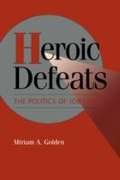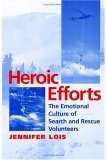- Table View
- List View
Hereditary Physicians of Kerala: Traditional Medicine and Ayurveda in Modern India
by Indudharan MenonThis book examines the history and evolution of Ayurveda and other indigenous medical traditions in juxtaposition with their encounter with colonial modernity. Through the lens of hereditary folk and Ayurvedic practitioners, it focuses on Kerala’s heterogeneous medical traditions and presents them against the backdrop of the geographical, historical, sociocultural, ethnographic and regional contexts in which they developed and transformed. The author explores the world of Kerala’s last traditionally trained hereditary practitioners (folk healers, poison therapists, Sanskrit-speaking Muslim Ayurvedic practitioners and the legendary Brahman Ashtavaidyan physicians). He discusses the views of these physicians regarding the marked difference between their personalised ancestral methods of treatment and the standardised version of Ayurveda compliant with biomedicine that is practised by doctors today. Drawing on extensive fieldwork, this book will be useful to researchers and scholars of medical anthropology, health and social medicine, sociology and social anthropology, the history of science and modern Indian history, as well as to medical practitioners interested in alternative and traditional medicine.
Heritage Conservation and Tourism Development at Cham Sacred Sites in Vietnam: Living Heritage Has A Heart (Global Vietnam: Across Time, Space and Community)
by Quang Dai TuyenThis open access book considers the growing field of heritage tourism from community perspectives. It explores how the Cham—Vietnam’s large ethnic minority—reconcile their needs for economic development with the boundaries circumscribed by their traditional culture. It examines struggles that local minority stakeholders like the Cham face when trying to participate in areas of development that typically fall under State control. How will tourism affect the ancient sacred spaces that are the Cham’s lifeblood? In what areas is their participation permitted? From what areas are they excluded? Through a novel mix of indigenous methods, participant observation, local voices, and rich ethnographic description, this book provides a rare glimpse into the discourses that have been percolating throughout the community in recent years. The relevance of this study extends beyond the Cham community, and aims to resonate with experiences of the myriad indigenous and minority communities around the world who face similar issues with heritage conservation and tourism development. This book is of interest to students and researchers of heritage studies, tourism management, cultural studies, Asian studies, as well as policymakers, and academicians seeking current research on the connections between culture, conservation, sustainable development, and tourism.
Heritage Knowledge in the Curriculum: Retrieving an African Episteme
by Joyce E. King Ellen E. SwartzMoving beyond the content integration approach of multicultural education, this text powerfully advocates for the importance of curriculum built upon authentic knowledge construction informed by the Black intellectual tradition and an African episteme. By retrieving, examining, and reconnecting the continuity of African Diasporan heritage with school knowledge, this volume aims to repair the rupture that has silenced this cultural memory in standard historiography in general and in PK-12 curriculum content and pedagogy in particular. This ethically informed curriculum approach not only allows students of African ancestry to understand where they fit in the world but also makes the accomplishments and teachings of our collective ancestors available for the benefit of all. King and Swartz provide readers with a process for making overt and explicit the values, actions, thoughts, and behaviors reflected in an African episteme that serves as the foundation for African Diasporan sociohistorical phenomenon/events. With such knowledge, teachers can conceptualize curriculum and shape instruction that locates people in all cultures as subjects with agency whose actions embody their ongoing cultural legacy.
Heritage Language Policies around the World (Routledge Studies in Sociolinguistics)
by Corinne A. Seals Sheena ShahHeritage language policies define the context in which heritage languages are maintained or abandoned by communities, and this volume describes and analyzes international policy strategies, as well as the implications for the actual heritage language speakers. <P><P>This volume brings together heritage language policy case studies from around the world, foregrounding globalization by covering five regions: the Americas, Europe, Africa, Asia, and Australasia. The countries profiled include the United States, Canada, Argentina, Norway, Sweden, Ireland, Uganda, Namibia, Morocco, Japan, South Korea, Singapore, New Zealand, Australia, and Fiji. This volume also highlights an expanded definition of ‘heritage language’, choosing to focus on individual and community identities, and therefore including both Indigenous and immigrant languages. <P><P>Focusing specifically on language policy relating to heritage languages, the chapters address key questions such as <li>Are heritage languages included or excluded from the national language policy discourse? <li>What are the successes and shortcomings of efforts to establish heritage language policies? <li>What is the definition of ‘heritage language’ in official usage by the local/regional government and stakeholders? <li>How are these language policies perceived by the actual heritage language communities?
Heritage Stone Conservation in Urban Churchyards: Merging Necrogeography, Historical Archaeology, And Geomorphology (SpringerBriefs in Geography)
by Mary J. Thornbush Sylvia E. ThornbushThis book provides a cross-disciplinary perspective on the degradation and deterioration of the cultural record encompassed by urban headstones located in parish churchyards. Its interdisciplinary approach allows the geomorphological analysis of rock weathering to be combined with the impacts on the cultural record, its interpretation, and management. In particular, by examining the impacts of air pollution on the weathering of these cultural markers, cross-temporal assessments can provide valuable information concerning the condition of the record and its sustainability potential as monuments of cultural heritage.Churchyards located in urban settings have grown in interest for the purposes of heritage conservation research. Specifically, headstones represent part of the historical and archaeological record and are recognised as a component of historical archaeology. They are also now approached from the standpoint of heritage conservation, either as monuments or cultural stone as well as being part of necrogeography through their address of burial and stone decay.In this brief, headstones located in parish churchyards in England and Scotland, as part of the Anglican record for the Church of England and the Presbyterian record for the Church of Scotland, were examined using non-destructive methods based on field observations since preliminary research in 2006 as part of a decadal scale (long-term) study. This multisite investigation captures the record since the 17th century, and mainly comprises limestone (England) and sandstone (Scotland) headstone markers that still remain upright. Most studied headstones appear before the 19th century, when this study’s temporal focus terminates. Seriations performed on the available record have revealed trends in style based on inscriptions, epitaphs, and motifs as well as quantified dimensions, shapes, and more. This study represents an attempt to pictorially record cultural stone and to observe cross-temporal and spatial change at various scales. As such, it offers a valuable resource for practitioners, e.g. conservators and archaeologists, as well as for students and researchers.
Heritage and Archaeology in the Digital Age: Acquisition, Curation, And Dissemination Of Spatial Cultural Heritage Data (Quantitative Methods In The Humanities And Social Sciences Ser.)
by Thomas E. Levy Marinos Ioannides Matthew L. Vincent Víctor Manuel López-Menchero BendichoThis book examines how computer-based programs can be used to acquire ‘big’ digital cultural heritage data, curate, and disseminate it over the Internet and in 3D visualization platforms with the ultimate goal of creating long-lasting “digital heritage repositories.’ The organization of the book reflects the essence of new technologies applied to cultural heritage and archaeology. Each of these stages bring their own challenges and considerations that need to be dealt with. The authors in each section present case studies and overviews of how each of these aspects might be dealt with. While technology is rapidly changing, the principles laid out in these chapters should serve as a guide for many years to come. The influence of the digital world on archaeology and cultural heritage will continue to shape these disciplines as advances in these technologies facilitate new lines of research. serif">The book is divided into three sections covering acquisition, curation, and dissemination (the major life cycles of cultural heritage data). Acquisition is one of the fundamental challenges for practitioners in heritage and archaeology, and the chapters in this section provide a template that highlights the principles for present and future work that will provide sustainable models for digital documentation. Following acquisition, the next section highlights how equally important curation is as the future of digital documentation depends on it. Preservation of digital data requires preservation that can guarantee a future for generations to come. The final section focuses on dissemination as it is what pushes the data beyond the shelves of storage and allows the public to experience the past through these new technologies, but also opens new lines of investigation by giving access to these data to researchers around the globe. Digital technology promises significant changes in how we approach social sciences, cultural heritage, and archaeology. However, researchers must consider not only the acquisition and curation, but also the dissemination of these data to their colleagues and the public.Throughout the book, many of the authors have highlighted the usefulness of Structure from Motion (SfM) work for cultural heritage documentation; others the utility and excitement of crowdsourcing as a ‘citizen scientist’ tool to engage not only trained students and researchers, but also the public in the cyber-archaeology endeavor. Both innovative tools facilitate the curation of digital cultural heritage and its dissemination. Together with all the chapters in this volume, the authors will help archaeologists, researchers interested in the digital humanities and scholars who focus on digital cultural heritage to assess where the field is and where it is going.
Heritage in the Digital Era: Cinematic Tourism and the Activist Cause (Routledge Advances in Sociology)
by Rodanthi TzanelliWhat happens to traditional conceptions of heritage in the era of fluid media spaces? ‘Heritage’ usually involves intergenerational transmission of ideas, customs, ancestral lands, and artefacts, and so serves to reproduce national communities over time. However, media industries have the power to transform national lands and histories into generic landscapes and ideas through digital reproductions or modifications, prompting renegotiations of belonging in new ways. Contemporary media allow digital environments to function as transnational classrooms, creating virtual spaces of debate for people with access to televised, cinematic and Internet ideas and networks. This book examines a range of popular cinematic interventions that are reshaping national and global heritage, across Europe, Asia, the Americas and Australasia. It examines collaborative or adversarial articulations of such enterprise (by artists, directors, producers but also local, national and transnational communities) that blend activism with commodification, presenting new cultural industries as fluid but significant agents in the production of new public spheres. Heritage in the Digital Era will appeal to students and scholars of sociology, film studies, tourist studies, globalization theory, social theory, social movements, human/cultural geography, and cultural studies.
Heritage of Endurance: Family Patterns and Delinquency Formation in Urban Japan
by Hiroshi Wagatsuma George A. De VosThis title is part of UC Press's Voices Revived program, which commemorates University of California Press’s mission to seek out and cultivate the brightest minds and give them voice, reach, and impact. Drawing on a backlist dating to 1893, Voices Revived makes high-quality, peer-reviewed scholarship accessible once again using print-on-demand technology. This title was originally published in 1984.
Heritage, Diaspora and the Consumption of Culture: Movements in Irish Landscapes (Studies in Migration and Diaspora)
by Diane Sabenacio Nititham Rebecca BoydUsing an interdisciplinary and transhistorical framework this book examines the cultural, material, and symbolic articulations of Irish migration relationships from the medieval period through to the contemporary post-Celtic Tiger era. With attention to people’s different uses of social space, relationships with and memories of the landscape, as well as their symbolic expressions of diasporic identity, Heritage, Diaspora and the Consumption of Culture examines the different forms of diaspora over time and contributes to contemporary debates on home, foreignness, globalization and consumption. By examining various movements of people into and out of Ireland, the book explores how expressions of cultural capital and symbolic power have changed over time in the Irish collective imagination, shedding light on the ways in which Ireland is represented and Irish culture consumed and materialized overseas. Arranged around the themes of home and location, identity and material culture, and global culture and consumption, this collection brings together the work of scholars from the UK, Ireland, Europe, the US and Canada, to explore the ways in which the processes of movement affect the people’s negotiation and contestation of concepts of identity, the local and the global. As such, it will appeal to scholars working in fields such as sociology, politics, cultural studies, history and archaeology, with interests in migration, gender studies, diasporic identities, heritage and material culture.
Heritage, Homemaking, and Identity Formation in Migrant Workers: An Ethnographic Study of Yi Migrants in Shenzhen (Routledge Contemporary China Series)
by Junmin LiuLiu explores the experiences of Yi migrant workers in Shenzhen, China, investigating how their cultural heritage influences their search for identity and a sense of belonging. This book uncovers the intricate relationship between heritage and homemaking, examining how Yi migrants engage in their cultural practices within various settings such as families, workplaces, restaurants, tourist sites, and social media platforms.Through thorough fieldwork and interviews, the book demonstrates how ethnic heritage acts as a means for migrants to establish a feeling of connection during their migration journeys. Nevertheless, challenges and tensions emerge in the realm of home, illustrating the dynamic interplay between heritage and the construction of a sense of place. It also enriches our comprehension of the link between cultural heritage and the experiences of migrants, shedding light on the complexities of identity development in a globalised world.A valuable resource for scholars and researchers in disciplines like anthropology, migration studies, cultural studies, and Chinese studies, as well as professionals and policymakers interested in migrant integration, cultural heritage preservation, and urban development.
Heritage, Memory, and Punishment: Remembering Colonial Prisons in East Asia (Memory Studies: Global Constellations)
by Shu-Mei Huang Hyun-Kyung LeeBased on a transnational study of decommissioned, postcolonial prisons in Taiwan (Taipei and Chiayi), South Korea (Seoul), and China (Lushun), this book offers a critical reading of prisons as a particular colonial product, the current restoration of which as national heritage is closely related to the evolving conceptualization of punishment. Focusing on the colonial prisons built by the Japanese Empire in the first half of the twentieth century, it illuminates how punishment has been considered a subject of modernization, while the contemporary use of prisons as heritage tends to reduce the process of colonial modernity to oppression and atrocity – thus constituting a heritage of shame and death, which postcolonial societies blame upon the former colonizers. A study of how the remembering of punishment and imprisonment reflects the attempts of postcolonial cities to re-articulate an understanding of the present by correcting the past, Heritage, Memory, and Punishment examines how prisons were designed, built, partially demolished, preserved, and redeveloped across political regimes, demonstrating the ways in which the selective use of prisons as heritage, reframed through nationalism, leaves marks on urban contexts that remain long after the prisons themselves are decommissioned. As such, it will appeal to scholars of sociology, geography, the built environment, and heritage with interests in memory studies and dark tourism.
Heritage-Making in Hong Kong Through Culture and Religion
by Trevor Sofield Lawal Mohammed Marafa Fung Mei Li Kwo Fung ShekThis book centres on religious heritage-making where religion as a rich and diverse manifestation of culture and community empowerment lead to the transformation of place. Fusing heritage and religion in the novel multidisciplinary concept ‘heri-ligion’, the authors illuminate the dynamics of change inherent in religious-oriented heritage-making. Grounded in empirical evidence, this rich concept integrates religious tourism, heritage tourism, and community-based empowerment for sustainable development. Applying this unique concept to the once abandoned Hakka village of Yim Tin Tsai, the authors analyse the evolving paths of the island from its Hakka origins to a Christian pilgrimage site, and more recently, to a UNESCO cultural heritage site and thriving tourist destination. The authors foreground the important role of the scattered community as a key agent of change in facilitating a sustainable environment of Hong Kong’s only salt-producing place today. A dynamic example of community development and empowerment founded upon religious, cultural, industrial and natural heritage, this book uniquely contributes to tourism and heritage studies, human geography, cultural sociology, Hakka studies, Asian studies, and anthropology of religion.
Herlands: Exploring the Women's Land Movement in the United States
by Keridwen N. LuisHow women-only communities provide spaces for new forms of culture, sociality, gender, and sexuality Women&’s lands are intentional, collective communities composed entirely of women. Rooted in 1970s feminist politics, they continue to thrive in a range of ways, from urban households to isolated rural communes, providing spaces where ideas about gender, sexuality, and sociality are challenged in both deliberate and accidental ways. Herlands, a compelling ethnography of women&’s land networks in the United States, highlights the ongoing relevance of these communities as vibrant cultural enclaves that also have an impact on broader ideas about gender, women&’s bodies, lesbian identity, and right ways of living.As a participant-observer, Keridwen N. Luis brings unique insights to the lives and stories of the women living in these communities. While documenting the experiences of specific spaces in Massachusetts, Tennessee, New Mexico, and Ohio, Herlands also explores the history of women&’s lands and breaks new ground exploring culture theory, gender theory, and how lesbian identity is conceived and constructed in North America. Luis also discusses how issues of race and class are addressed, the ways in which nudity and public hygiene challenge dominant constructions of the healthy or aging body, and the pervasive influence of hegemonic thinking on debates about transgender women. Luis finds that although changing dominant thinking can be difficult and incremental, women&’s lands provide exciting possibilities for revolutionary transformation in society.
Hermann Hellers demokratischer Konstitutionalismus (Staat – Souveränität – Nation)
by Oliver W. Lembcke Verena FrickVon Haus aus Jurist und Staatsrechtslehrer, vertritt Hermann Heller einen demokratischen Konstitutionalismus, der die Wirklichkeit der Demokratie mit der Normativität des Rechts zusammendenkt. Was Hellers Werk dabei in besonderer Weise fruchtbar erscheinen lässt, ist die Verbindung von Staatsrechtslehre, Politikwissenschaft und Soziologie, die erst die komplexe Wirklichkeit der Demokratie erfahrbar macht. In seinen späten Weimarer Schriften – etwa zum Autoritären Liberalismus – zeigt sich Heller als Analytiker der Krise, der uns heute den Blick für die Herausbildung autoritärer Politikstrukturen insbesondere auf europäischer Ebene schärft. Neben dieser kritischen Perspektive auf die Konstellationen und Dynamiken der (zum Teil schleichenden) Autokratisierung politischer Prozesse lassen sich auf Grundlage des Hellerschen Werkes auch die Voraussetzungen gelingender demokratischer Stabilität benennen. Die Rekonstruktion dieses Ansatzes eines dezidiert demokratischen Konstitutionalismus steht im Zentrum des geplanten Sammelbandes.
Hermaphrodite Logic: A History of Intersex Liberation
by Juliana GleesonHow the intersex liberation movement exposed medical harms and became an inspiration to rethink sex and genderHERMAPHRODITE LOGIC is a bold examination of intersex liberation. Juliana Gleeson reveals how a move-ment challenged systemic medical abuses to reshape our understanding of sex. Blending philosophical insights and personal testimonies, Gleeson argues that intersex people have been harmed not just for therapeutic reasons but to ease professional andparental anxieties.
Hermeneutic Dialogue and Social Science: A Critique of Gadamer and Habermas (Routledge Studies in Social and Political Thought #31)
by Austin HarringtonThis book explores the writings of Gadamer and Habermas on hermeneutics and the methodology of the social sciences. By re-examining their views of earlier interpretive theorists, from Wilhelm Dilthey to Max Weber and Alfred Schutz, it offers a radical challenge to their idea of the 'dialogue' between researchers and their subjects.
Hermeneutic Phenomenology in Education: Method and Practice (Practice of Research Method #4)
by Norm Friesen Tone Saevi Carina HenrikssonHermeneutic phenomenology is a combination of theory, reflection and practice that interweaves vivid descriptions of lived experience (phenomenology) together with reflective interpretations of their meanings (hermeneutics). This method is popular among researchers in education, nursing and other caring and nurturing practices and professions.
Hermeneutic Philosophy and the Sociology of Art: An Approach to Some of the Epistemological Problems of the Sociology of Knowledge and the Sociology of Art and Literature (Routledge Library Editions: Continental Philosophy #4)
by Janet WolffThis book, first published in 1975, is an examination of the theoretical foundation of the sociology of art and literature and an in-depth study in the sociology of knowledge. In discussing and clarifying some of the important philosophical issues in this field, the constant underlying reference is to the creative and artistic-expressive areas of knowledge – so that the better understanding of the social nature and genesis of all knowledge may point the way towards a similar comprehension of art and society.
Hermeneutics and Social Science: Approaches to Understanding (Routledge Revivals)
by Zygmunt BaumanOriginally published in 1978, this important work, by one of the leading European social theorists, is arguably the best introduction to the hermeneutic tradition as a whole. It is designed to help students of sociology and philosophy place the problems of "understanding social science" in their historical and philosophical context. It does so by presenting the major current in sociological thought as responses to the challenge of hermeneutics. The idea that true knowledge of social life can be attained only if human conduct is seen as meaningful action whose meaning is accordingly grasped has been presented as a discovery of recent sociology. In fact its history is long and its connections plentiful, reaching beyond the boundaries of sociology itself. Yet it is in sociology that the hermeneutic tradition has attracted most interest but most misinterpretation. The debate is in full swing and there is no attempt to offer "correct" solutions - the emphasis instead is upon revealing the strengths and weaknesses of each of the main approaches. However it is Bauman's view that the theory of understanding may achieve valid results only if it treats the problem of understanding as an aspect of the ongoing process of social life.
Hermits: The Insights of Solitude
by Peter FranceOurs is an age where solitude tends to be discussed in the context of the 'problem of loneliness'. However in previous ages the capacity to seek fulfillment outside society has been admired and seen as a measure of discernment and inner security. In this lucid and highly readable book, Peter France shows how hermits, from the Taoists and Ancient Greeks to the present day, have something vitally important to say to a society that fears solitude.
Hero on a Mission: A Path to a Meaningful Life
by Donald MillerNew York Times bestselling author Donald Miller shares the plan that led him to turn his life around.There are four characters in every story: The victim, the villain, the hero, and the guide. These four characters live inside us. If we play the victim, we&’re doomed to fail. If we play the villain, we will not create genuine bonds. But if we play the hero or guide, our lives will flourish. The hard part is being self-aware enough to know which character we are playing.In this book, Donald will use his own experiences to help you recognize if the character you are currently surfacing is helping you experience a life of meaning. He breaks down the transformational, yet practical, plan that took him from slowly giving up to rapidly gaining a new perspective of his own life&’s beauty and meaning, igniting his motivation, passion, and productivity, so you can do the same.The lessons in this book will teach you how to:Help you discover when you are playing the victim and villain.Create a simple life plan that will bring clarity and meaning to your goals ahead.Take control of your life by choosing to be the hero in your story.Cultivate a sense of creativity about what your life can be.Move beyond just being productive to experiencing a deep sense of meaning.Donald Miller will help you identify the many chances you have of being the hero in your life, and the times when you are falling into the trap of becoming the victim. He will guide you in developing a unique plan that will speak to the challenges you currently face so you, too, can find the fulfillment you have been searching for in your life and work.
Heroes Are Human: Lessons in Resilience, Courage, and Wisdom from the COVID Front Lines
by Bob DelaneyIn Heroes are Human: Lessons in Resilience, Courage and Wisdom from the COVID Front Lines, we read gripping first-hand accounts by those thrust into the depths of the crisis.This book is a must-read for health care workers who have been besieged by the ongoing pandemic, for those who love them, and for any reader wanting to gain a deeper understanding of their immense sacrifices and struggles. Heroes are Human also offers invaluable self-care insights in the face of trauma. The book&’s central voice and guide, Bob Delaney, is an internationally respected and experienced figure in the field of post-traumatic stress. His powerful message to front-line caregivers is that they are not alone. Delaney, along with co-author and award-winning journalist Dave Scheiber, published Covert: My Years Infiltrating the Mob (Sterling Publishing, 978-1-4027-5442-2, Hardcover, 2008; 978-1-4027-6714-2, trade paper, 2009) and Surviving the Shadows: A Journey of Hope into Post-traumatic Stress (Sourcebooks, 978-1-4022-6355-2, 2011). Covert is the true story of Delaney&’s undercover life in a landmark 1970s Mafia investigation, dubbed &“Project Alpha,&” for which he risked his life wearing a wire as a young New Jersey State Trooper, taking on a new identity as a mob associate. He also writes about his overcoming PTSD through the sport of basketball, and career as an elite NBA referee. Surviving the Shadows tells the stories of brave men and women whose lives were plunged into despair by post-traumatic stress but who learned to cope, with Delaney&’s help, by sharing their struggles with others who underwent similar trauma. For more than a quarter of a century, Delaney was a fixture as a referee on the hardwood courts of the National Basketball Association (NBA). But what Delaney did—and has done—off the courts defines his true legacy: It is his less visible, life-saving work of the last four decades, helping active members and veterans of the U.S. armed forces, law enforcement, fire fighters, and first responders—the often under-appreciated heroes who put their lives on the line for the rest of us every day—cope with the devastating effects of post-traumatic stress. Delaney comes by his healing wisdom from hard-won experience. He learned about PTSD first-hand, developing the condition after emerging from his grueling and prolonged undercover work. Helping others suffering from the debilitating effects of post-traumatic has been a driving force in his life. Former President Barack Obama and senior-ranking military leaders have honored Delaney for his contributions to PTSD awareness—stemming from his multiple visits with U.S. troops in Iraq and Afghanistan, and throughout Europe, Asia, and the United States. In addition, Delaney was twice awarded the U.S. Army Outstanding Civilian Service Medal, presented by General Raymond T. Odierno (retired U.S. Army Chief of Staff) and Four-Star General (ret.) Robert W. Cone. In 2020, the NCAA bestowed its highest honor on him: the Theodore Roosevelt Award, previously given four U.S. presidents (Dwight Eisenhower, Gerald Ford, George H.W. Bush and Ronald Reagan). More recently, Delaney has become deeply involved with the prestigious Harvard Global Mental Health initiative, which focuses on traumas and psychological burdens experienced throughout the world.
Heroes and Cowards: The Social Face of War
by Matthew E. Kahn Dora L. CostaWhen are people willing to sacrifice for the common good? What are the benefits of friendship? How do communities deal with betrayal? And what are the costs and benefits of being in a diverse community? Using the life histories of more than forty thousand Civil War soldiers, Dora Costa and Matthew Kahn answer these questions and uncover the vivid stories, social influences, and crucial networks that influenced soldiers' lives both during and after the war. Drawing information from government documents, soldiers' journals, and one of the most extensive research projects about Union Army soldiers ever undertaken, Heroes and Cowards demonstrates the role that social capital plays in people's decisions. The makeup of various companies--whether soldiers were of the same ethnicity, age, and occupation--influenced whether soldiers remained loyal or whether they deserted. Costa and Kahn discuss how the soldiers benefited from friendships, what social factors allowed some to survive the POW camps while others died, and how punishments meted out for breaking codes of conduct affected men after the war. The book also examines the experience of African-American soldiers and makes important observations about how their comrades shaped their lives. Heroes and Cowards highlights the inherent tensions between the costs and benefits of community diversity, shedding light on how groups and societies behave and providing valuable lessons for the present day.
Heroic Defeats: The Politics Of Job Loss
by Helen V. Milner Robert H. Bates Ellen Comisso Peter Lange Miriam A. Golden Joel Samuel MigdalHeroic Defeats is a comparative investigation of how unions and firms interact when economic circumstances require substantial job loss. Using simple game theory to generate testable propositions about when these situations will result in industrial conflict, Professor Golden illustrates the theory in a range of situations between 1950 and 1985 in Japan, Italy, and Britain. Additionally, the author shows how the theory explains why strikes over job loss almost never occur in postwar unionised firms in the United States. With its blend of rational choice and comparative politics, Heroic Defeats is the first systematic attempt to account for industrial conflict or its absence in situations of mass job loss. This book should be of interest to political scientists, sociologists, economists, and students of labour and industrial relations, as well as specialists in European and Japanese history.
Heroic Efforts: The Emotional Culture of Search and Rescue Volunteers
by Jennifer LoisWinner of the 2006 Outstanding Recent Contribution Award from the American Sociological Association, Sociology of Emotions Section.Many search and rescue workers voluntarily interrupt their lives when they are called upon to help strangers. They awake in the middle of the night to cover miles of terrain in search of lost hikers or leave work to search potential avalanche zones for missing skiers, snowboarders, and snowmobilers in blizzard conditions. They often put their own lives in danger to rescue stranded, hypothermic kayakers and rafters from rivers. Drawing on six years of participant observation and in-depth interviews, Jennifer Lois examines the emotional subculture of “Peak,” a volunteer mountain-environment search and rescue team. Rescuers were not only confronted by physical dangers, but also by emotional challenges, including both keeping their own emotions in check during crisis situations, and managing the emotions of others, such as those they were rescuing. Lois examines how rescuers constructed meaning in their lives and defined themselves through their heroic work. Heroic Efforts serves as an easy to understand sociological introduction to the ways emotions develop and connect us to our surroundings, as well as to the links between the concept of heroism and other sociological theories such as those on gender stereotypes and edgework.
